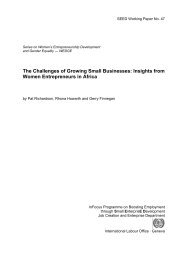manual: women workers' rights and gender equality - International ...
manual: women workers' rights and gender equality - International ...
manual: women workers' rights and gender equality - International ...
You also want an ePaper? Increase the reach of your titles
YUMPU automatically turns print PDFs into web optimized ePapers that Google loves.
Exercise<br />
Step 1<br />
• Ask the participants what kind of basic <strong>rights</strong> they think they have or should have at work.<br />
• If they come up with a right that is shown on one of the cards show it to the group. Put it at a<br />
place where everybody can see it. When the participants do not come up with more <strong>rights</strong> but<br />
you still have some cards left, show them one by one <strong>and</strong> discuss them briefly.<br />
Step 2<br />
• Explain what the Labour Code 1997 is.<br />
• Explain that only formal sector workers are covered by this Code but that this does not mean<br />
that informal sector workers do not have any <strong>rights</strong>. Some of the basic <strong>rights</strong> are mentioned in<br />
the constitution so every Cambodian citizen should enjoy these <strong>rights</strong>. Examples are equal pay<br />
for equal work <strong>and</strong> freedom of association.<br />
• Explain briefly:<br />
- what an ILO Convention is<br />
- that the Cambodian Government ratified 12 Conventions<br />
- that this ensures <strong>rights</strong> to them as workers<br />
- that the ILO adopted the Declaration of Fundamental Principles <strong>and</strong> Rights at Work in 1998<br />
<strong>and</strong> that this covers the fundamental principles of 8 key conventions on the following 4<br />
subjects:<br />
1. Freedom of association <strong>and</strong> the right to collective bargaining (card 1)<br />
2. Elimination of all forms of forced <strong>and</strong> compulsory labour (card 2)<br />
3. Effective abolition of child labour (card 3)<br />
4. Elimination of discrimination in employment <strong>and</strong> occupation (card 4)<br />
• Discuss briefly the four cards showing the fundamental workers’ <strong>rights</strong> using the following<br />
questions:<br />
- Did they know about this right?<br />
- Do they enjoy this right?<br />
- If not what can they do to fight for this right?<br />
• Explain for each card how the <strong>rights</strong> of Cambodian workers are protected regarding each<br />
subject<br />
Step 3<br />
• As an energizer you can sing some songs with the participants about <strong>rights</strong> at work or<br />
difficulties they have at work. Ask the participants to come up with songs. Examples are given at<br />
the end of the notes for the trainer.<br />
Step 4<br />
• Discuss the two cards regarding basic <strong>women</strong> workers’ <strong>rights</strong> <strong>and</strong> ask again the following<br />
questions:<br />
- Did they know about this right?<br />
- Do they enjoy this right?<br />
- If not what can they do to fight for this right?<br />
• Explain for each card how the <strong>rights</strong> of Cambodian workers are protected regarding each<br />
subject.<br />
Step 5<br />
• Give a summary of the discussion <strong>and</strong> summarize the <strong>rights</strong> on the cards once more.<br />
Emphasize that organizing yourself makes you stronger if you want to fight for your <strong>rights</strong>.<br />
53

















